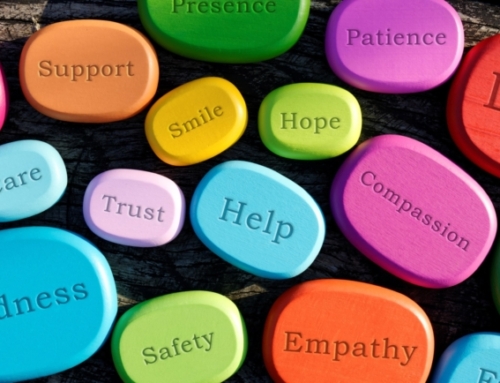Are you feeling stuck in your life? Many people are. No one is immune. Neither wealth nor health nor younger or older age protects against feeling stuck and desiring change, some sort of change that remains elusive.
To be stuck presupposes that a person 1) is not happy with their current life, 2) has tried to undertake change but not succeeded, and 3) is losing hope they will ever find a way out.
Today I introduce the approach of simply paying attention as a way past stuckness.
The Attention Approach
Not uncommonly even a person who feels unhappy and stuck is not ready to take on a formal program of change and/or doesn’t know what it is that they want. In the Attention Approach, the goal is simply to start paying more attention to life as it unfolds. Let me explain.
You’ve no doubt heard the saying that ‘the journey is the goal.’ This is meant to highlight that ‘life is not a problem to solve,’ that living one’s life is not nor should it be a project of change designed to reach a goal or, at least, not merely that. This saying is in silent competition with ‘the goal is the goal.’
There is indeed much to value in the motto ‘the journey is the goal.’ But this is not quite right. The journey or, perhaps better said, the act of journeying, takes you where you need to go. Where you need to go, however, is not necessarily a goal. You indeed end up somewhere – you end up at the end of your life – but you weren’t trying to get to that ‘there’ as your goal. So, there’s more here than ‘the goal is the goal’ and ‘the journey is the goal.’ What is this elusive missing piece?
The life journey takes (carries) you along, to the place at which you end up. You both undertake this journey through agentic decisions and actions, and you also undergo it through confronting situations you got to through conditions you did not fully control nor, once you got to these situations, do you fully control.
Once you end up wherever you end up, one can say that’s where you were destined to end up. But you may ask; “Isn’t where I end up random or semi-random? After all, I was never in full control of this journey. Since so much was outside my control, how can I feel that where I end up is my destiny to end up at?”
My answer is that once you reach that end, every step to get you there turns out to be necessary to form you as the person who got to that endpoint and no other. The random or contingent turns into the necessary.
During your life’s journeying, with the journey encompassing conditions that you both control and do not control, you are formed. The life journey is not merely an adventure of interesting and, in some measure, of pleasurable and painful events you experience. It is a formative journey. This process of formation occurs from ongoing relationality among both parts within yourself and outside yourself. You become you through this continual interaction with yourself and the people and things of the world.
The first step in appreciating this journeying that forms you is to pay attention. You already have all the functions you need to pay attention in the manner they need to be paid. You are sufficiently provisioned for this journey.
When you remain mindful of yourself as being on a journey of formation, every feeling, thought, and action you take and every interaction you have becomes imbued with significance, with a sense of the unrepeatable import of it, the sacredness of it.
You live out your life in what I call an unfolding occasion. An occasion is simply a situation – any situation – in which you remain mindful of its uniqueness, its unrepeatability, and its gift of letting you form into yourself. You form from the occasion through your undertaking and undergoing it, through the choices you make and the actions you take within that occasion – one which you partly control and partly do not. And within the occasion, it is not only you forming yourself and being formed because, at the same time, through your participation in this occasion, you allow others there with you to form themselves and to be formed out of that occasion, including through your decisions and actions. An occasion is a mutual dance of each participant unfolding into who they unfold into from out of themselves and through interaction with everyone and everything else. (Nota Bene: the English poet Gerard Manley Hopkins called this process ‘selving.’)
And as you pay attention in each and every occasion you find yourself in, allow that which you notice and affects you to guide you to your upcoming decision and action. In this way, your life can be experienced as rich beyond measure. Continue journeying, attending, and making choices from the ‘you’ that you have become at that moment. When journeying, you are continually changed and changing and updating your endowment of experience, skill, and wisdom. And it is from that ever becoming you that you choose and act.
And in that moment at which you arrive you will know what to do if you only attend to what you, in that moment of occasion, feel and know what to do, that you know you must do to reach the you that is moving to your end. The import of this is that you do not always need to figure everything out ahead of time. Instead, you can hold off, choose, and act from out of the occasion you are in and not attempt to preordain your decisions or actions ahead of time. By taking this step, the gigantic burden of always carrying the (unknown) future within yourself will lift. Once you realize this, you may be moved to tears. Decide and act not only at the right time but from out of that right time. This way of living requires trust, trust in yourself, and in the wisdom of the occasion itself. (Of course, I’m not against foresight and planning based on foreseeable risks.)
Now, whether you find what I wrote here valuable and moving or valueless and absurd or even simply confusing, know this: irrespective of your normative judgment, what I write here is not theoretical. Rather it is available to you and any one of us as a lived (living) experience.
When you live in the light of the gift of the unrepeatable occasion, hard things become easy (or easier) because they become just the way you must choose as the way of journeying into yourself. It is experiencing and acting from out of the dimension of destiny. You are then ‘destinying’ through life in a manner worthy of its gift. Of course, staying open to this dimension of being is not easy. It is easy to forget and stop paying attention. It helps to include reminders in one’s day to help return attention to this way of being and experiencing. And of course, everyone wavers, and doubt sets in. This is simply part of the journey and itself an occasion for growth.
Until next time,
LanguageBrief
“Realize deeply that the present moment is all you have. Make the NOW the primary focus of your life.” ― Eckhart Tolle
“Life can only be understood backwards; but it must be lived forwards.” ― Søren Kierkegaard
“Be patient toward all that is unsolved in your heart and try to love the questions themselves.” ― Rainer Maria Rilke
“I am not what happened to me, I am what I choose to become.” ― Carl Jung
“It’s not what you look at that matters, it’s what you see.” ― Henry David Thoreau







Leave A Comment